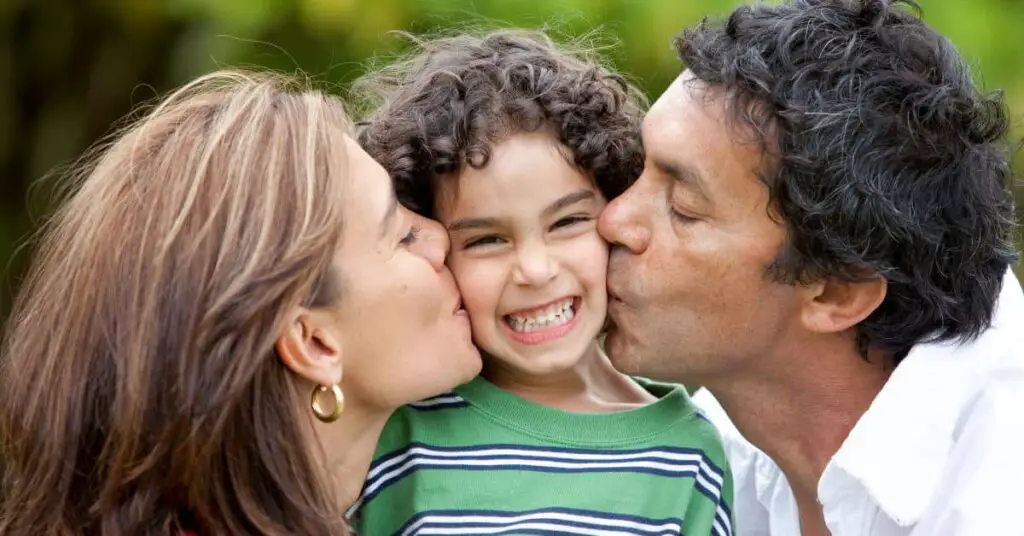Positive parenting aims to raise happy, well-adjusted children through nurturing their development in a safe, supportive environment. While there is no single “right” way to parent, research has found that certain strategies tend to produce better outcomes for both children and parents. This article will explore the five core principles of positive parenting backed by developmental psychology.
Establish Secure Attachment
According to attachment theory, the emotional bond formed between a child and their primary caregivers greatly impacts their social-emotional development. Children develop internal working models of relationships based on their early experiences with caregivers. A secure attachment means the child views caregivers as a safe base from which to explore the world.
When caregivers are consistently warm, loving, and responsive to a child’s needs, the child feels secure, fostering independence and self-esteem. Some ways to build secure attachment include holding babies, showing affection through hugs and kisses, responding sensitively to cries/requests, engaging in quality time like reading together, and expressing emotion openly. This connection forms the foundation of trust essential for healthy social skills and lifelong relationships.
Promote Respect
Respect is a core parenting principle emphasized by positive psychologists like Alfie Kohn. It is important to treat children—and all human beings—with the dignity, courtesy, and fairness they deserve. Some specific ways to demonstrate respect include:
- Listening to children without judgment and considering their perspective
- Explaining rules and discipline respectfully rather than threatening punishment
- Respecting personal boundaries by not touching or invading privacy without permission
- Using positive language instead of insults when correcting behavior
Respect fosters self-esteem in children. It also builds trust so they feel comfortable coming to parents with struggles knowing they will be heard compassionately.
Act Proactively
Proactive parents address issues smoothly before they escalate by being attentive, foreseeable, and addressing root causes. They think ahead about potential problems by considering their child’s developmental stage, temperament, and family situation. Some proactive strategies include:
- Establishing routines to set clear expectations
- Giving warnings before transitions to prepare emotionally
- Redirecting inappropriate behavior politely before discipline
- Teaching conflict resolution skills to defuse tensions
- Noticing triggers for misbehavior to prevent escalation
Being proactive is less stressful than reacting impulsively during a disciplinary situation. It fosters self-control as children internalize limits through guidance instead of fear of consequences.
Show Empathetic Leadership
Positive parents are benevolent leaders who guide children to independence using empathy, clear expectations, and involvement rather than permissiveness or authoritarian control. Some practices of empathetic leadership include:
- Listening to understand a child’s point of view before making decisions
- Explaining reasoning calmly behind rules without anger or threats
- Offering choices to teach decision-making within limits
- Praising effort and character development rather than just accomplishments
- Partnering with children to jointly solve problems versus ruling over them
Empathetic leaders consider a child’s needs and perspectives and fulfill their vital role as a source of wisdom. However, they still hold boundaries firmly with patience and care.
Implement Thoughtful Discipline
Positive discipline aims to teach rather than to punish. It focuses on facilitating internal motivation in children to do right through open communication of how actions impact others. Some thoughtful discipline strategies include:
- Removing privileges or adding responsibilities proportionately
- Using natural consequences that demonstrate cause and effect
- Having respectful discussions about why a behavior was wrong
- Expressing disappointment in the action versus anger at the child
- Offering positive reinforcement regularly for good choices
When discipline results from care rather than a “need to be in control”, children internalize lessons in constructive ways that build their character. They also maintain healthy trust in parents as allies on their journey.
The Impact of Parenting Principles
Research strongly suggests that applying positive parenting principles through secure attachment, respect, proactivity, empathetic leadership, and thoughtful discipline leads to substantial benefits. A longitudinal study of over 17,000 children found authoritative parenting was strongly correlated with higher self-esteem and academic success. Similarly, research shows authoritative parenting promotes independence in adolescents without weakening family bonds.
Positive parenting also protects children’s long-term mental health. A survey of over 500 families by the Child Mind Institute demonstrated authoritative care lowers risks of depression and anxiety disorders into adulthood compared to permissive, authoritarian, or uninvolved styles. By contrast, inconsistent, disrespectful, or disengaged parenting can undermine a child’s well-being for years.
Ultimately, positive parenting strengthens parent-child relationships, self-esteem, academic success, mental resilience, and overall well-being according to empirical research. When implemented proactively through secure connections, kindness, direction, and discipline rooted in empathy, it cultivates children’s potential to flourish responsibly as happy, confident individuals.
Common Questions about Positive Parenting Principles
How can I apply these principles if I wasn’t parented this way?
Fortunately, positive parenting strategies can still benefit any family at any age or stage. Having an awareness of the principles enables a shift toward them gradually through self-reflection. Spend quality time listening to children non-judgmentally, own mistakes respectfully, and seek their input on issues using “I feel” statements. With patience and compassion, nurture secure bonds through daily routines, rituals, and affection.
What if another caregiver, like an ex, doesn’t use these methods?
Focus on the parenting approach within your control. Through secure attachment to you, children can be resilient even amid inconsistent care elsewhere. Calmly coordinate with others to share strategies and curb potential confusion whenever possible. Either way, unconditional love from one stable caregiver provides stability, as does minimizing put-downs of others in front of children.
Are these principles useful for parenting adopted/blended families too?
Absolutely. While unique challenges inevitably arise, the same principles apply regardless of a child’s origin story or family structure. Secure connections stem from reliability, warmth, and open communication rather than biology alone. Thinking proactively about each individual’s temperament, background, and insecurities helps blended families flourish through empathetic compassion.
How can these ideas strengthen positive discipline for toddlers/teens?
For toddlers, positive discipline means closely supervising, using “gentle parenting” techniques like redirection, setting developmentally appropriate expectations, and distracting from meltdowns patiently with hugs. Teens equally need empathetic understanding, opportunities for autonomy balanced with involvement, compromise over control as well as open dialogue on conflicts. Positive discipline teaches valuable life lessons at any age when approached constructively instead of punitively.
Conclusion
While parenting perfectly is unrealistic, focusing proactively on secure attachment, respect, empathy, vision, and thoughtful correction fosters children’s well-being holistically according to research. By prioritizing relationships through quality engagement, nurturing independence with guidance, and handling misbehavior respectfully, families can thrive dynamically according to each member’s talents. With compassion for ourselves and children alike amid inevitable frustrations, positive parenting cultivates happiness, resilience, and moral character for all.






